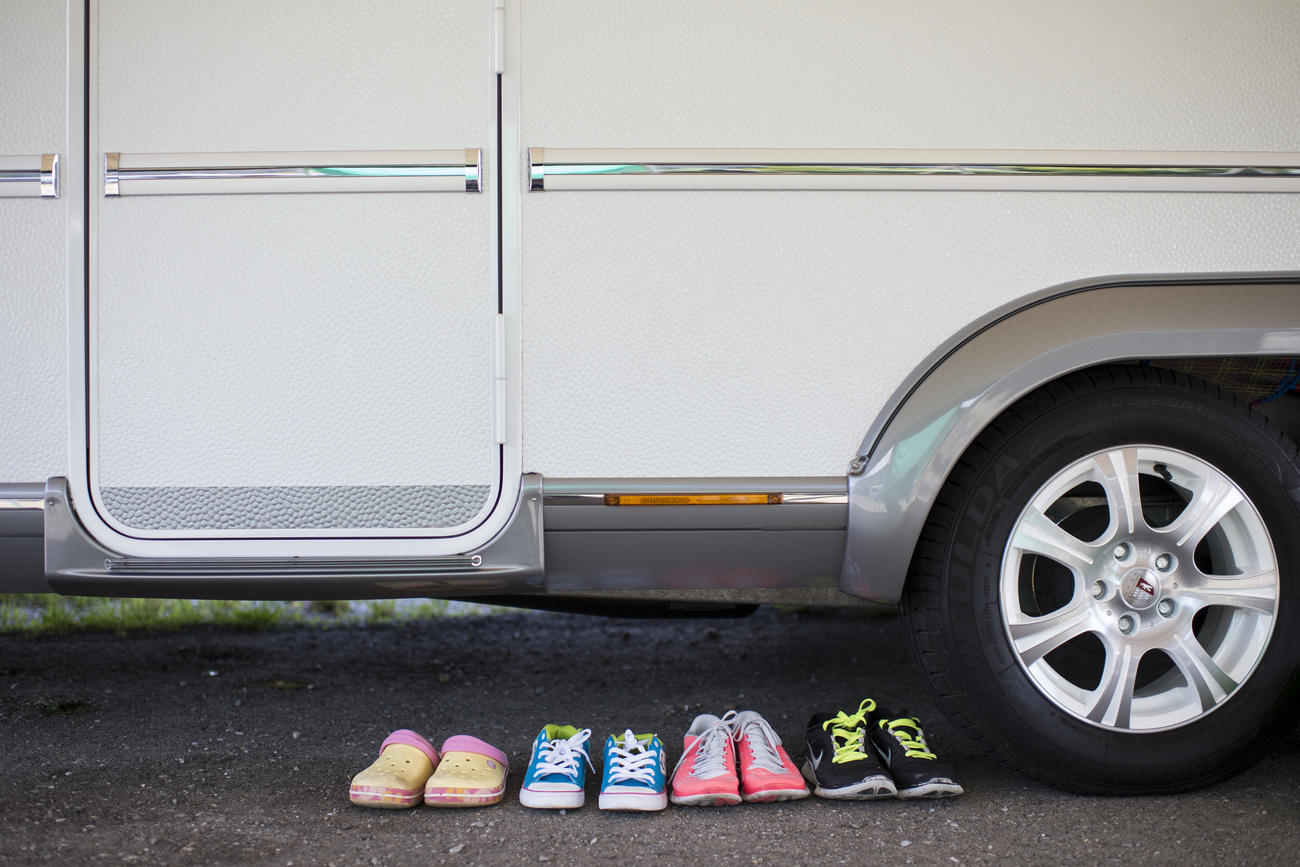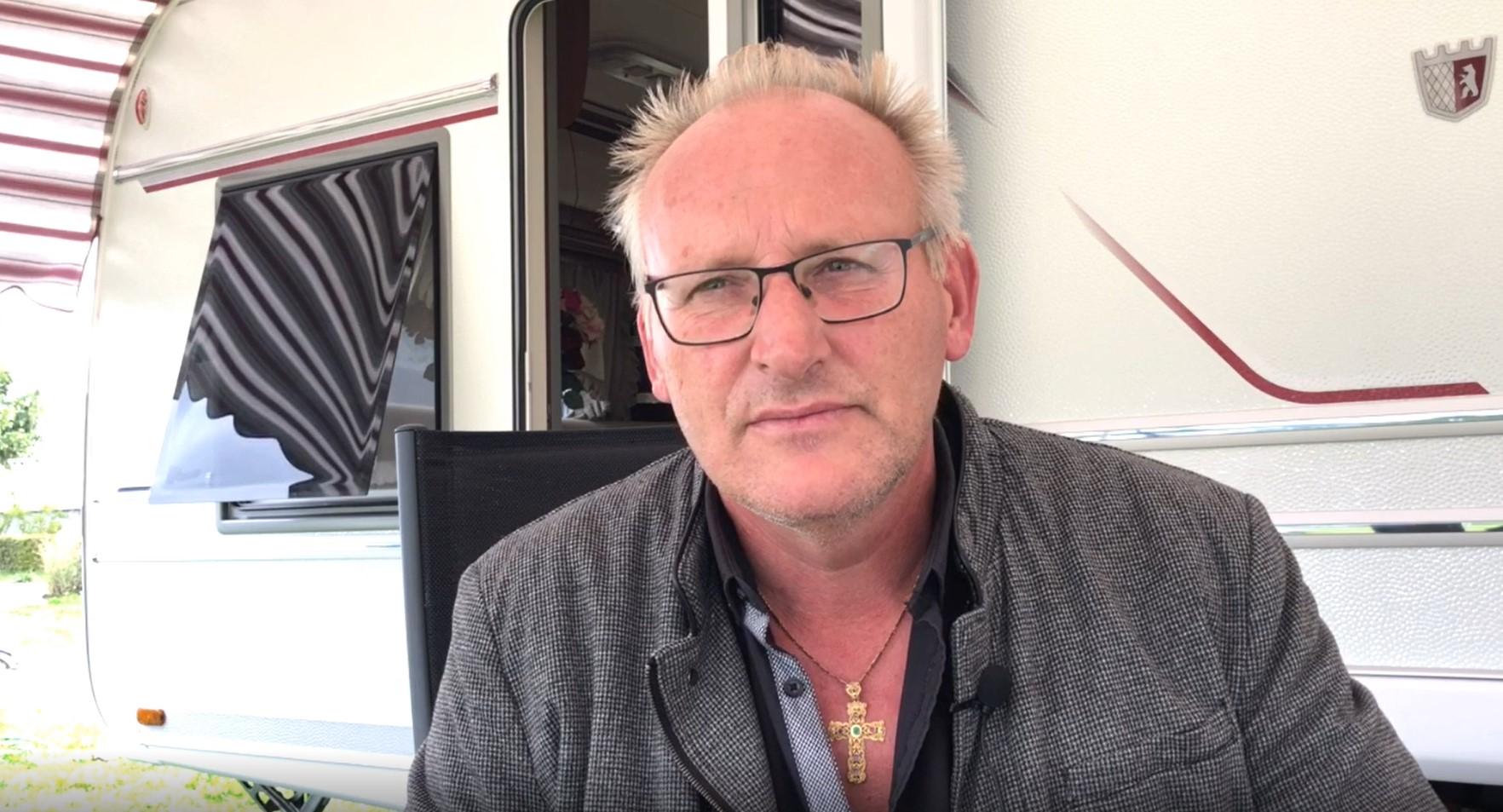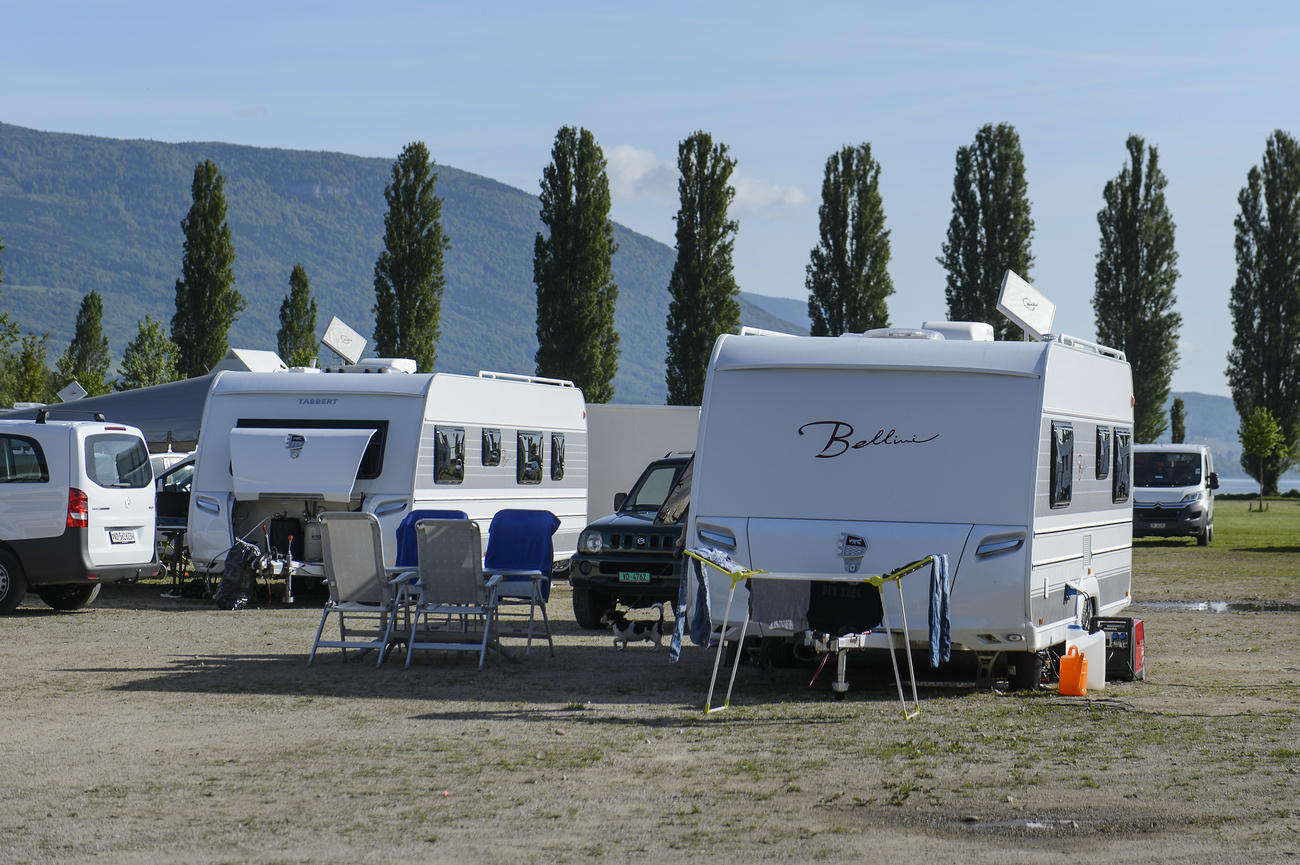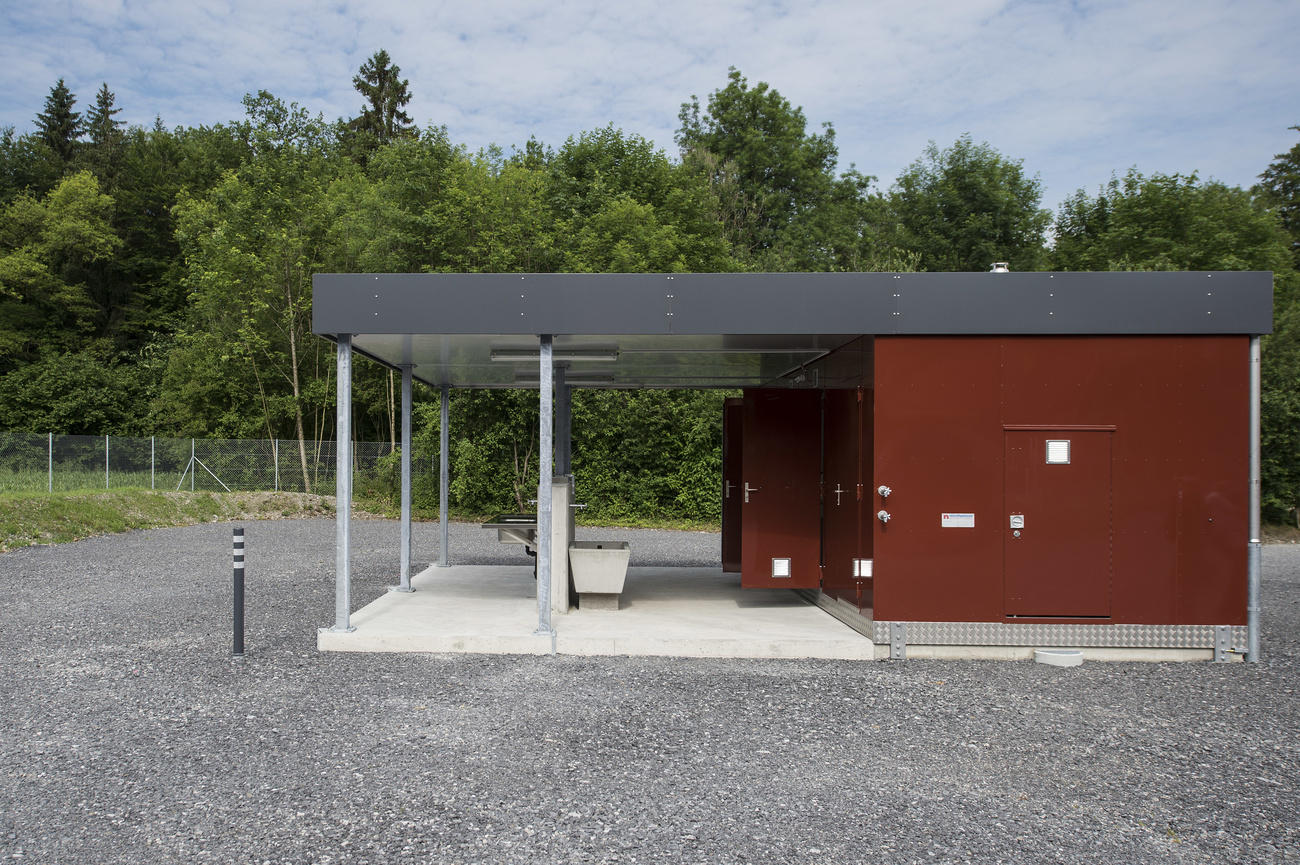
Switzerland’s nomads face an endangered way of life

Switzerland recognises its population of nomadic people as a national minority. But the number of areas available for these few thousand travelling citizens has been declining in recent years, threatening their way of life more than ever.
Yenish:External link In Switzerland, there are an estimated 30,000, some 3,000 of whom still maintain the travelling way of life. They are Swiss citizens and thus are an ethnic group native to this country. The group is also found in Austria and Germany.
Sinti:External link Also known in French as “Manouches”, Sinti people live in Germany, France and Italy. They are descended from Romany Gypsies who migrated to central Europe in the 15th century. In Switzerland, Sinti people number about 400. They too are Swiss citizens and often live together with Yenish.
Sanitary facilities, water supply, electricity networks and room for fifteen caravans. That would be enough to satisfy the Swiss nomadic community, made up of Yenish and Sinti people. But this type of stopping places – short-stay areas for persons belonging to these minorities – is becoming harder to find.
There were 46 sites in 2000, but in 2015, this dropped to 31. Most of the sites are temporary, and many are only open a few weeks a year, complicating the way of life for Swiss travelling people.
The supportExternal link groups for Yenish and Sinti people say that there should be about 80 designated locations distributed evenly around Switzerland. Winter residential sites are particularly lacking with only about 15, whereas there should be 40.
There is also a shortage of sites for the large groups of European travelling peopleExternal link who come looking for seasonal work in Switzerland during the summer. There are only seven sites when ten would help meet demand.
This lack of sites means the travellers have to spend a lot of time and energy looking for a place to stay. “We are under constant stress”, explains Albert Barras, a spokesman for the Yenish and Sinti travellers in French-speaking Switzerland. “It would be a lot simpler just to give us sites. Then the authorities wouldn’t hear anymore from us.”

More
‘The spaces are often too crowded’
Barras criticises the low number of long-term sites available: “Everything is temporary! There are barely 15 sites in Switzerland that we can really use.” He says there is a particular shortage in French-speaking Switzerland, where there are only temporary sites in Jura and Neuchâtel cantons. “Ideally there should be two short-term and one long-term site available in each canton”, Barras maintains. “Especially as there is now a younger generation who also want to be on the road.”
National minorities
Yenish and Sinti have been recognised as a national minority since 1999, when Switzerland signed the Council of Europe’s Framework ConventionExternal link for the protection of minorities. This was part of an effort to preserve the identity of the Yenish and Sinti, including their nomadic lifestyle.
Swiss legislation on the promotion of cultureExternal link serves as the basis for actively supporting these minorities, and legislation on land-use planningExternal link requires all levels of government to manage available space in accordance with the needs of their population, which includes the needs of nomadic people. The country’s supremeExternal link court has also ruled that cantons, in their land-use planning, need to provide space for the travelling community.
Despite these legal measures as well as the establishment of a foundationExternal link to support the future of Swiss travelling people in 1997, campaigning by various Yenish and Sinti associations, and the adoption of an actionExternal link plan by the Swiss federal government in 2016, the situation on the ground shows little improvement.

Forgotten and excluded
Albert Barras has trouble understanding why the government has been so slow in providing new sites. “Some local communities have had bad experiences with groups of travelling people and won’t take in anyone now”, he gives as one possible reason. “We have also been forgotten, because we had to go underground for a long time to avoid Pro Juventute.”
The Yenish were particularly affected by the notorious ChildrenExternal link of the Roads programme, started in 1926 and run by the charitable foundation Pro Juventute, to combat “vagrancy”. With the support of all levels of the Swiss government, the foundation seized over 600 childrenExternal link from their Yenish parents and farmed them out to settled families – a practice that continued up until the 1970s.
The decline in the number of sites for travelling communities is mainly due to conflicts over land use, believes Simon Röthlisberger, general secretary of the Foundation to Ensure the Future of Swiss Travelling People. “Land to build on is getting scarce”, he says “and proposals for stopping places for travelling people are often in competition with other public or private proposals.”
“Structural discrimination”
For Angela Mattli, campaign coordinator for the Society forExternal link Threatened Peoples, the question of lack of sites for travelling people is part of a bigger problem. “In Switzerland, there is structural anti-Gypsy discrimination, a kind of collective amnesia”, she says. “Some kinds of discrimination have been recognised by the government, there are studies about this, but the findings are not made known to the public at large.”
This anti-Gypsy discrimination has been present in Switzerland for a long time, but nothing has ever really been done to counter it, the Society finds. In contrast, in the European Union, this kind of discrimination is recognised as such and concrete stepsExternal link are being taken.
In France, for example, there are more sites available for travelling people, often run by local governments. “In Switzerland, most sites are controlled and managed directly by the police. There you have your structural anti-Gypsy discrimination”, points out Mattli.

Increasing awareness
To try to get things moving, the Foundation to Ensure the Future of Swiss Travelling People and the association for land-use planning EspaceSuisseExternal link produced a publicationExternal link earlier this year on the subject of stopping places for Yenish, Sinti and Roma people.
With a description of the current legal framework and the kind of arrangements which work well, they aim to encourage cantonal and local governments to develop concrete proposals. “We are getting somewhere”, Röthlisberger finds. “But we still have a long way to go. The main thing is to foster the political will, then everything else will work better and quicker.”
“One idea would be for stopping places to be designated by the federal government, as is the case for refugee accommodation”, believes Mattli. The federal government, on the other hand, insists that responsibility for land-use planning belongs to the cantons. But federal ministries may provide financial support to associations and particular projects.
Apart from the issue of stopping places, the Society for Threatened Peoples would like the federal government to focus more on developing ways to counter anti-Gypsy discrimination. The Service for Combating RacismExternal link told swissinfo.ch that they take this matter very seriously, and that they have made it the topic of several studies, and regularly support projects involving Yenish, Sinti and Roma.

Barras says he is tired of the years of struggling to get more stopping places. He does see one positive development though: “overall, people understand us better now, and there has been progress in their thinking.” He hopes the public will eventually mobilise and drive governments to take practical action.
Stopping places made available to Swiss travelling communities are often managed by the police, but the conditions for using them vary from one town to another. In general, groups must register and make a deposit of between CHF200 to CHF300.
Most of the places are equipped with toilets, water supply and electricity network as well as a waste collection system. Prices are around CHF10-15 per night, per unit. In longer-term places to stay, often used during the winter, people generally pay a monthly rent based on the square metres.
Translated from French by Terence MacNamee

In compliance with the JTI standards
More: SWI swissinfo.ch certified by the Journalism Trust Initiative


























You can find an overview of ongoing debates with our journalists here . Please join us!
If you want to start a conversation about a topic raised in this article or want to report factual errors, email us at english@swissinfo.ch.